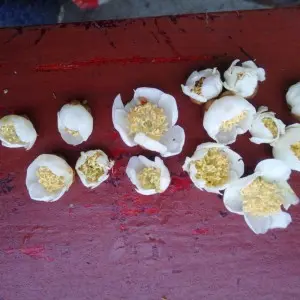Kiwi pollen is a high-quality, nutrient-rich substance that plays an essential role in the pollination and fruit production of kiwi orchards. Harvested from the male kiwi flowers, this pollen is known for its remarkable ability to enhance fertilization, leading to better fruit yields and superior fruit quality. Packed with vitamins, minerals, and antioxidants, kiwi pollen is not only vital for orchard growth but also offers numerous health benefits when consumed. Rich in essential amino acids and natural enzymes, it supports overall well-being and has been linked to improved immune function, increased energy levels, and enhanced skin health. In addition to its agricultural and health benefits, kiwi pollen is an increasingly popular ingredient in natural supplements and wellness products. For orchardists, the availability of high-quality kiwi pollen ensures optimal cross-pollination, which is key to achieving consistent and abundant harvests. As a powerful tool for enhancing both crop production and human health, kiwi pollen has emerged as a versatile product with growing appeal in agriculture and wellness sectors alike.
How Kiwi Pollen Enhances Pollination Efficiency in Orchards
Kiwi pollen plays a crucial role in enhancing pollination efficiency, ensuring better fruit yields and overall orchard productivity. Since kiwis are dioecious plants, meaning they have separate male and female plants, successful pollination relies on the transfer of pollen from male flowers to female flowers. Male kiwi flowers produce the pollen, while female flowers require it for fertilization and fruit set. This intricate process depends heavily on efficient pollen distribution, which is where kiwi pollen stands out.
The quality and quantity of kiwi pollen directly affect pollination efficiency. When male plants produce abundant, viable pollen, the chances of successful pollination increase, leading to a higher fruit set. Healthy pollen is essential for maximizing the fertility of female flowers and ensuring uniform growth across the orchard. In commercial kiwi orchards, good-quality pollen ensures that pollinators, such as bees, can effectively transfer pollen between flowers, resulting in optimal fertilization.
Moreover, kiwi pollen contributes to the overall health of pollinators. Rich in nutrients, including proteins and sugars, kiwi pollen provides the necessary sustenance for bees and other pollinators. Healthy pollinators are more effective at transferring pollen, leading to better pollination outcomes. Additionally, maintaining a balanced ratio of male to female plants in an orchard ensures that pollen is adequately available for pollinators, further enhancing pollination efficiency.
The Importance of Kiwi Pollen Quality for Successful Pollination
Kiwi pollen quality is a critical factor for successful pollination and optimal fruit production in orchards. As kiwi plants are dioecious, meaning they require separate male and female plants for fertilization, the quality of pollen from male plants directly influences the fertility and yield of female plants. High-quality pollen is essential for achieving a successful cross-pollination process, which is key to maximizing fruit set and improving overall orchard productivity.
The quality of kiwi pollen can affect its viability, which refers to the ability of the pollen to fertilize the female flowers and initiate fruit development. Viable pollen must be fresh, full of nutrients, and free of contaminants such as diseases or pests. When pollen is of high quality, pollinators like bees can transfer it effectively between flowers, resulting in a higher fertilization rate and better fruit set. In contrast, low-quality pollen may lead to incomplete pollination, reducing the overall yield and quality of the harvest.
Kiwi pollen is also rich in essential nutrients like proteins and sugars, which support the health and productivity of pollinators. Healthy pollinators are more efficient at transferring pollen, which further boosts pollination success. Without sufficient or high-quality pollen, pollinators may struggle to gather enough nutrients, reducing their effectiveness and slowing down the pollination process.

